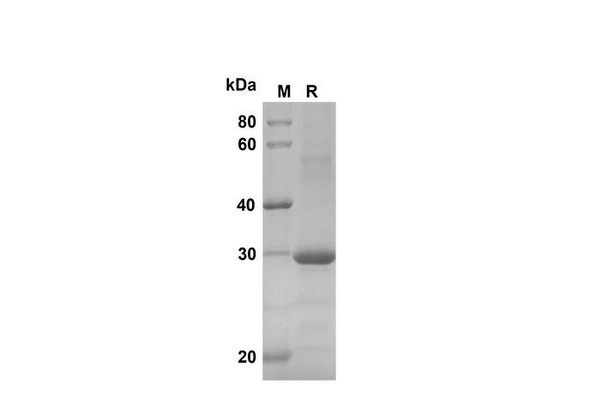Recombinant Rat CXCL3 Protein (Trx Tag) (RPES8226)
- SKU:
- RPES8226
- Size:
- 20μg
- Tag:
- N-Trx
- Reactivity:
- Rat
- Expression Host:
- E.coli
- Accession:
- Q10746
Frequently bought together:
Description
| Product Name: | Recombinant Rat CXCL3 Protein (Trx Tag) |
| SKU: | RPES8226 |
| Size: | 20μg |
| Tag: | N-Trx |
| Reactivity: | Rat |
| Expression Host: | E.coli |
| Accession: | Q10746 |
| Sequence: | Arg33-Ser101 |
| Calculated Molecular Weight: | 27.6 kDa |
| Observed Molecular Weight: | 30 kDa |
| Synonyms: | C-X-C motif chemokine 3, C-X-C motif chemokine ligand 3, Chemokine (C X C motif) ligand 3, Chemokine (CXC motif) ligand 3, Cinc 2, CINC 2b, Cinc2, CINC2b, CXCL 3, Cxcl3, CXCL3, Cytokine induced neutrophil chemoattractant 2, Dcip1, Dendritic cell inflammatory protein 1, Gm1960, GRO protein gamma, GRO-gamma, GRO-gamma(1-73), GRO-gamma(5-73), GRO3, GRO3 oncogene, GROG, Growth regulated protein gamma, Growth-regulated protein gamma, Macrophage inflammatory protein 2 beta precursor, Macrophage inflammatory protein 2-beta, Melanoma growth stimulatory activity gamma, Member 3, MGSA gamma, MIP 2b, MIP2-beta, MIP2B, SCYB3, Small inducible cytokine subfamily B |
| Endotoxin: | < 10 EU/mg of the protein as determined by the LAL method |
| Purity: | > 90% as determined by reducing SDS-PAGE. |
CXCL3 is involved in migration, invasion, proliferation and tubule formation of trophoblasts and may play a key role in the pathogenesis of preeclampsia. CXCL3 autocrine/paracrine pathways are involved in the development of prostate cancer by regulating the expression of the target genes that are related to the progression of malignancies. CXCL3 is a novel adipokine that facilitates adipogenesis in an autocrine and/or a paracrine manner through induction of c/ebpb and c/ebpd. CXCL3 and its receptor CXCR2 are overexpressed in prostate cancer cells, prostate epithelial cells and prostate cancer tissues, which may play multiple roles in prostate cancer progression and metastasis.
| Bio-activity: | Not validated for activity |
| Formulation: | Lyophilized from a 0.2 μm filtered solution in PBS with 5% Trehalose and 5% Mannitol. |
| Reconstitution: | It is recommended that sterile water be added to the vial to prepare a stock solution of 0.5 mg/mL. Concentration is measured by UV-Vis. |
| Storage: | Generally, lyophilized proteins are stable for up to 12 months when stored at -20 to -80℃. Reconstituted protein solution can be stored at 4-8℃ for 2-7 days. Aliquots of reconstituted samples are stable at < -20℃ for 3 months. |
| Shipping: | This product is provided as lyophilized powder which is shipped with ice packs. |






